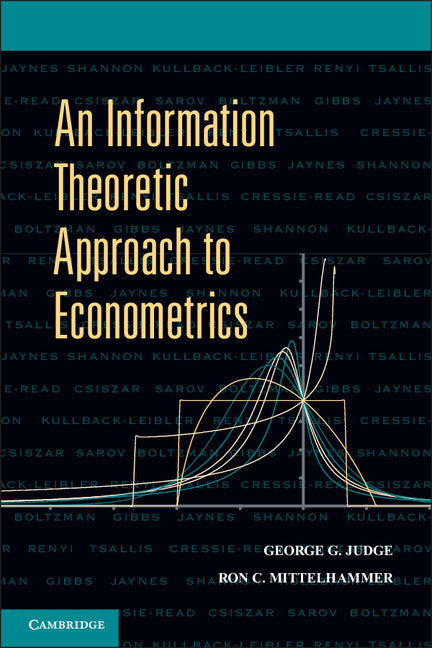Freshly Printed - allow 8 days lead
Couldn't load pickup availability
An Information Theoretic Approach to Econometrics
Intended to provide the reader with a firm conceptual and empirical understanding of basic information-theoretic econometric models and methods.
George G. Judge (Author), Ron C. Mittelhammer (Author)
9780521869591, Cambridge University Press
Hardback, published 12 December 2011
248 pages, 13 b/w illus. 7 tables
23.5 x 15.5 x 1.8 cm, 0.46 kg
'This is a definitive book: Judge and Mittelhammer are legendary architects of modern information econometrics. It provides both a practical exposition to the subject matter, as well as an extremely thorough presentation of the underlying statistical analysis of information theory and empirical likelihood applied to econometrics models. I highly recommend this book, which will be widely read, referenced, and used by students, instructors and researchers in the areas of econometrics, economics, statistics and other applied sciences.' Aman Ullah, University of California, Riverside
This book is intended to provide the reader with a firm conceptual and empirical understanding of basic information-theoretic econometric models and methods. Because most data are observational, practitioners work with indirect noisy observations and ill-posed econometric models in the form of stochastic inverse problems. Consequently, traditional econometric methods in many cases are not applicable for answering many of the quantitative questions that analysts wish to ask. After initial chapters deal with parametric and semiparametric linear probability models, the focus turns to solving nonparametric stochastic inverse problems. In succeeding chapters, a family of power divergence measure-likelihood functions are introduced for a range of traditional and nontraditional econometric-model problems. Finally, within either an empirical maximum likelihood or loss context, Ron C. Mittelhammer and George G. Judge suggest a basis for choosing a member of the divergence family.
Preface
1. Econometric information recovery
Part I. Traditional Parametric and Semiparametric Probability Models: Estimation and Inference: 2. Formulation and analysis of parametric and semiparametric linear models
3. Method of moments, GMM, and estimating equations
Part II. Formulation and Solution of Stochastic Inverse Problems: 4. A stochastic-empirical likelihood inverse problem: formulation and estimation
5. A stochastic-empirical likelihood inverse problem: inference
6. Kullback-Leibler information and the maximum empirical exponential likelihood
Part III. A Family of Minimum Discrepancy Estimators: 7. The Cressie-Read family of divergence measures and likelihood functions
8. Cressie-Read-MEL-type estimators in practice: evidence of estimation and inference sampling performance
Part IV. Binary Discrete Choice MPD-EML Econometric Models: 9. Family of distribution functions for the binary response-choice model
10. Estimation and inference for the binary response model based on the MPD family of distributions
Part V. Optimal Convex Divergence: 11. Choosing the optimal divergence under quadratic loss
12. Epilogue.
Subject Areas: Economic statistics [KCHS], Econometrics [KCH]


